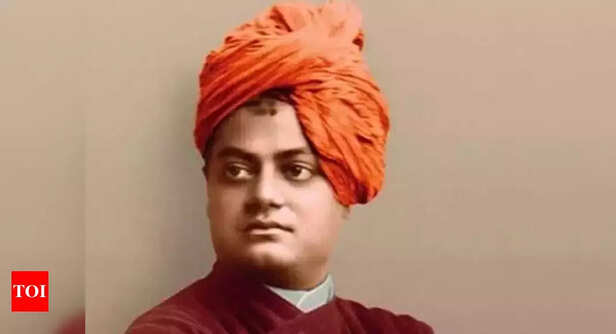‘Jai Shri Ram is Not Hindutva’ – Tharoor Breaks the Silence on Religion & Politics
Nidhi | Feb 03, 2025, 12:27 IST
( Image credit : Times Life Bureau )
Shashi Tharoor clarifies the real essence of Hinduism in his recent statement, saying ‘Jai Shri Ram is not Hindutva.’ He urges people to embrace the spiritual teachings of Hinduism and warns against reducing it to a political identity. Read on to discover his take on how Hinduism should be practiced beyond political slogans.
At the Jaipur Literature Festival, Congress leader Shashi Tharoor reignited a thought-provoking debate about the true essence of Hinduism. His statement—"Jai Shri Ram is not Hindutva"—was not a rejection of Hindu devotion but a call to reflect on the growing politicization of faith.
In his speech, Tharoor explained that Hinduism has never been about enforcing beliefs upon others. Instead, it has always embraced multiple spiritual paths, self-inquiry, and a deeply personal connection with the divine. He referenced Swami Vivekananda, who famously rejected religious fanaticism and emphasized that Hinduism is about seeking truth, not forcing conformity.
But today, we often see Hindu identity being reduced to slogans and aggressive nationalism—something Tharoor strongly opposed. So, what does Hinduism really teach, and where do we draw the line between faith and political Hindutva?

Hinduism is not a monolithic faith—it offers multiple ways to reach spiritual enlightenment. In his speech, Tharoor explained four key paths, rooted in ancient scriptures like the Bhagavad Gita and the Upanishads:
This path is for seekers of wisdom, those who approach spirituality through reading, questioning, and deep thinking. Adi Shankaracharya, for instance, championed this path by delving into Vedantic philosophy.
This is the most widely practiced path, where devotees express their faith through prayers, rituals, and devotion to deities. Chanting "Jai Shri Ram" in devotion is a part of Bhakti Yoga, but as Tharoor emphasized, faith must come from within, not be imposed.
This is the path of inner transformation—practiced through meditation, self-discipline, and mindfulness. Many yogis and seekers follow this approach, looking inward for truth rather than outward validation.
This path, followed by Mahatma Gandhi, teaches that serving humanity is the highest form of devotion. True Hinduism isn’t about shouting slogans—it’s about righteous action.
Tharoor’s argument was clear: Hinduism is not about forcing others to comply; it is about self-realization and freedom to choose one’s spiritual journey.
In his speech, Tharoor referenced Swami Vivekananda, one of Hinduism’s most revered spiritual leaders. He quoted:

"The Hindu will never light the fires of inquisition. There is no place for saying, mine is the only way."
This idea directly contradicts the growing trend of religious aggression. Tharoor criticized those who reduce Hinduism to a rigid, exclusionary identity—where people are forced to chant "Jai Shri Ram" under pressure.
He pointed out:
"Some, unfortunately, claim in the name of Hinduism—they sort of reduce it to something like the team identity of the British football hooligan. And they say, you don’t support my team, I’m going to hit you on the head. Don’t say ‘Jai Shri Ram,’ I’m going to flog you. That’s not Hinduism. That has nothing to do with Hinduism."
This is a powerful distinction. Hinduism, as per Vivekananda, has never been about coercion or exclusion. It is about acceptance, spiritual growth, and diversity of thought.
Historically, "Jai Shri Ram" has been a sacred expression of devotion to Lord Ram, who represents righteousness (dharma) and justice. However, in recent years, the slogan has been politicized and weaponized in ways that contradict Ram’s teachings.
Would Lord Ram—who left his throne for his father’s honor, upheld justice, and showed compassion even to his enemies—approve of his name being used to intimidate others?
Tharoor’s argument was not against chanting "Jai Shri Ram" but against the forced imposition of faith, which goes against the very spirit of Hinduism. Ram himself never demanded loyalty—he inspired it through his actions.
✔ Multiple spiritual paths (Jnana, Bhakti, Raja, Karma Yoga)
✔ Freedom to seek truth without dogma
✔ Compassion, selfless service, and moral righteousness (dharma)
✔ An inclusive, evolving philosophy that respects diversity
✖ A tool for political supremacy
✖ A rigid identity that demands blind allegiance
✖ A justification for violence or coercion
✖ A slogan-based movement rather than a spiritual journey
Tharoor’s message is not anti-Hinduism—it is a call to reclaim its true essence. Hinduism is a vast, introspective, and deeply personal philosophy, not a tool for political division.
The Bhagavad Gita teaches that true dharma is about righteousness and free will, not fear or compulsion. The Ramayana teaches that Lord Ram’s greatness lay in his honor, patience, and humility—not in how many people chanted his name.
In a world where identity politics is overshadowing spiritual truth, perhaps the real question we need to ask is:
Are we embodying the values of Lord Ram, or are we merely using his name?
In his speech, Tharoor explained that Hinduism has never been about enforcing beliefs upon others. Instead, it has always embraced multiple spiritual paths, self-inquiry, and a deeply personal connection with the divine. He referenced Swami Vivekananda, who famously rejected religious fanaticism and emphasized that Hinduism is about seeking truth, not forcing conformity.
But today, we often see Hindu identity being reduced to slogans and aggressive nationalism—something Tharoor strongly opposed. So, what does Hinduism really teach, and where do we draw the line between faith and political Hindutva?
1. Tharoor’s Four Paths to Being a Good Hindu

Spirituality is the Salvation
( Image credit : Times Life Bureau )
Hinduism is not a monolithic faith—it offers multiple ways to reach spiritual enlightenment. In his speech, Tharoor explained four key paths, rooted in ancient scriptures like the Bhagavad Gita and the Upanishads:
Jnana Yoga (Path of Knowledge)
Bhakti Yoga (Path of Devotion)
Raja Yoga (Path of Meditation & Discipline)
Karma Yoga (Path of Selfless Action)
Tharoor’s argument was clear: Hinduism is not about forcing others to comply; it is about self-realization and freedom to choose one’s spiritual journey.
2. The Swami Vivekananda Perspective: Hinduism vs. Religious Fanaticism

Swami Vivekananada
( Image credit : Timeslife )
"The Hindu will never light the fires of inquisition. There is no place for saying, mine is the only way."
This idea directly contradicts the growing trend of religious aggression. Tharoor criticized those who reduce Hinduism to a rigid, exclusionary identity—where people are forced to chant "Jai Shri Ram" under pressure.
He pointed out:
"Some, unfortunately, claim in the name of Hinduism—they sort of reduce it to something like the team identity of the British football hooligan. And they say, you don’t support my team, I’m going to hit you on the head. Don’t say ‘Jai Shri Ram,’ I’m going to flog you. That’s not Hinduism. That has nothing to do with Hinduism."
This is a powerful distinction. Hinduism, as per Vivekananda, has never been about coercion or exclusion. It is about acceptance, spiritual growth, and diversity of thought.
3. ‘Jai Shri Ram’ – A Devotional Chant or a Political Slogan?
Would Lord Ram—who left his throne for his father’s honor, upheld justice, and showed compassion even to his enemies—approve of his name being used to intimidate others?
Tharoor’s argument was not against chanting "Jai Shri Ram" but against the forced imposition of faith, which goes against the very spirit of Hinduism. Ram himself never demanded loyalty—he inspired it through his actions.
4. What Hinduism Teaches vs. What It Is Being Turned Into
What Hinduism Stands For
✔ Freedom to seek truth without dogma
✔ Compassion, selfless service, and moral righteousness (dharma)
✔ An inclusive, evolving philosophy that respects diversity
What Hinduism Is Not
✖ A rigid identity that demands blind allegiance
✖ A justification for violence or coercion
✖ A slogan-based movement rather than a spiritual journey
Returning to the True Spirit of Hinduism
The Bhagavad Gita teaches that true dharma is about righteousness and free will, not fear or compulsion. The Ramayana teaches that Lord Ram’s greatness lay in his honor, patience, and humility—not in how many people chanted his name.
In a world where identity politics is overshadowing spiritual truth, perhaps the real question we need to ask is:
Are we embodying the values of Lord Ram, or are we merely using his name?
